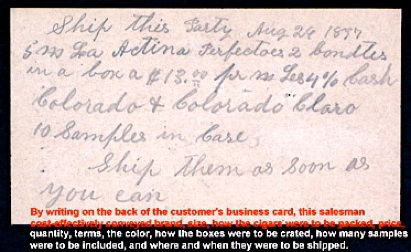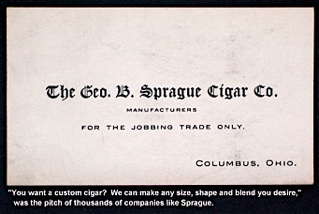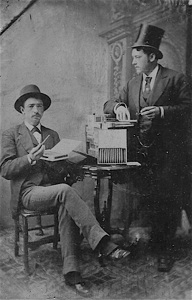Cigar Salesmen on the Road
A National Cigar History Museum Exhibit
Text & images © Tony Hyman, all rights reserved

Cigar Salesmen on the Road
A National Cigar History Museum Exhibit
Text & images © Tony Hyman, all rights reserved
Cigar salesmen were men, generally age 17 to 50. A small percentage of them, perhaps as few as 500 over time, represented giant cigar factories, or their distribution arm. Tens of thousands of other salesmen represented brokers, jobbers, distributers, wholesalers, and other friendly folks who supply your local retailers with the goods they sell to you.
Many cigar salesmen, with or without their employer’s permission, also sold notions, gum, razors, and the like. Some carried competitor’s goods, under the sure-to-make-a-sale theory. Some salesmen were independents, some on salary, some only on commission. There were too many salesmen and too many situations for me to generalize too much.
To a rural young man of the industrial age the road out of town was alluring, and becoming a traveling salesman was a more reasonable ambition than becoming a circus performer. Salesmen appeared to lead romantic lives. They dressed well, and traveled to distant places. They were on the move finding adventure, not stuck milking a cow every day. Best of all, salesmen were popular, the center of attention wherever they went filled with jokes and stories, frequently about meeting lonely farmer’s daughters.
But alas, like many a romantic notion, the reality wasn’t as glamorous, involving hard work, sleepless nights, dreadful travel conditions, fierce competition, con men and many a not-so-metaphorical door slammed in your face. Salesmen came and went. Some lasting barely long enough to get their business cards printed.
Salesmen were nicknamed “drummers” because their job was to drum up business like the musician drummers that preceded traveling shows since the middle ages.
Cigar wholesalers were deluged by salesman wannabes who offered to represent them, and asked for samples. These post-card dropping con men often accepted the free cigars and were never heard from again. Cigar factories and brokers protected themselves by getting paid up front for samples. A salesmen was required to ‘buy into’ the system. If he found the work too hard or too unrewarding and quit, the wholesaler wasn’t out anything. Full price was typically charged for the samples.
How the System Worked
The following instructions are excerpted from a letter written to a newly hired salesman by A F Morris, a Cincinnati wholesaler with a dozen branch offices scattered through the South and Midwest in August 1900:
Some were more fashionably dressed than others.
[0525]
Tintype depicts two dandies with a pile of boxes ready for the road.
[w0000] Not in the NCM collection.
Salesmen were sometimes as young as 16.
The photo was given sometime in the late 1880’s to “Miss Mary Patterson,” perhaps before the young man’s first trip.
[0524]
The long sample box he’s carrying, unfolds, then opens to display 9 different types, brands, blends, prices... whatever the salesman wants. A label and price sticker can easily be removed or pasted over (as some of these are). [0577]
Cigar salesmen takes orders in a posed studio shot with an exotic Southwestern set.
Cabinet photo, late 1870’s
[0510]
[0513]
Salesmen at work
This is a typical medium size tobacconist store around 1915, just before World War One, the all machine-made cigar, and the end of the cigar’s Golden Age. A town of a few thousand people could support a tobacconist with one or two clerks.
M.M. Broga, a sales agent in an 1870’s wagon, asks the retailer to not order cigars or whips from someone else and oblige (buy from him when he arrives). Whips and cigars, a “why didn’t I think of that?” combination. Not many folks in the same line. [1156]
It’s not a gag. New England’s American Whip Company was making cigars in the 1860’s and 1870’s.
Wagon peddlers have been bombarded with fees and licenses since the first cart carried vegetables to farmer’s market on public roads 5,000 years ago.
Taxing visitors is a strategy every town understands.
Traveling salesmen were easy prey, frequently fined for ‘violations.’ Counties, cities and towns saw licenses as a profit making way to keep out riff-raff. Justified in some cases. Life was fairly anonymous. Con men of all types operated everywhere in America.
This 1½” pin was required to be worn while in town.
[0454]
Much of America was served by horse and buggy before World War One.
This advance advertising post card has the peddler’s message on the reverse. Each child holds a product, the toddler a box of cigars. The older girl is pointing at the camera in the manner of a TV pitchman.
From Michigan, Oct. 23, 1914
Wife, Grace, writes to a friend:
“If you want some apples, pears, etc., come down. Come Sunday if no other time. Garfield has 2 more weeks on the road.””
“Referring to that proposed new Branch, I have been looking you up [through sources other than the references I got out of your letter] and have conclu-ded to offer you the appointment of Manager.
“The salary will be $100 per month during the first three months and after that, $125, you to defray your own expenses...
“It costs time, money and “shoe leather” to assume permanently the role of a Drummer [traveling salesman,ed.], while if you gradually merge it into a wholesale business and let your customers do some of the running, your expenses will be less, sales greater and occupation more pleasant.
“There will be three items of expenses: traveling expenses, sample cigars, and office or store rent. Traveling expenses should not cost over $15-$20 a month...The expense arising from the steady consumption of samples is a necessary evil, much regretted but unavoidable. Not only will your customers have to sample everything new, but a man in the business is supposed to give his customers a cigar occasionally. This item will likely run $5 a month...
“As to your office rent, you can arrange at first to have headquarters at your home and after a few weeks we will establish ourselves in a nice office or small store, either alone, or with some one else already in business who can spare us a corner. 10 or 15 feet of space will answer nicely... accommodations ought to be had there, reasonably centrally located, for $5-$8 a month. The office will be stocked at my expense with a supply ranging from $100 to $500...”
“We must open an office as soon as the goods are introduced and in demand. Demand is brought about by four things: (1) large fine variety, (2) superior quality, (3) personal hustling on the part of the agent in visiting the trade and making himself, the house, the goods and the agency known to them, (4) newspaper advertising, which always and invariably “makes the mare go” and which I will indulge in as soon as is practicable.
“Sample cigars cost us more than stock goods as twice the number of boxes and labels are required [they were packed in boxes of 25, not 50: tony] and the goods themselves are all ‘selected’ which means considerable added cost... you ought to have samples of everything on your list: the 10¢ goods because they not only count up fast in money, but are profitable; the Cheap Brands as many will want the cheapest thing you have; the Fancy Goods as they are great sellers; the High Grade 5¢ goods as a necessity as they are our SPECIALTIES. As a matter of fact, you ought to have them all for it is not right to go at anything of this kind in a half-hearted manner and poorly equipped... a complete line will cost you about $20. You will always want two sample boxes of each brand you are carrying, one to keep intact for showing the appearance of the goods and the other to be using for loose sample smokers. If this makes everything clear you can forward the money for your line of samples and we will got to work on your equipment. [I can furnish you with] a neat sample case for $1. My case will please you as it fits the sample boxes and I will have your name and address nicely embossed in silver, which not only adds to the first-class appearance but will render it less liable to theft.
A good salesmen sells everywhere he can
When speed and route flexibility were important, salesmen travelled on horseback.
A good salesmen sells everywhere he can. This satirical label from the early 1880’s pokes fun at the remote lengths to which a salesman went to make that sale.
[0556]
Early salesmen’s Receipts
[0517] [0516]
Currency and hard coin were hard to come by in March of 1833 when John Ownes sold “four boxes cigars” (4,000 cigars) for $5 on consignment. The shop keeper was free to charge whatever the traffic would bear.
In 1833 West of the Mississippi was almost unknown and untraveled. The Erie canal was a major route of freight carriers. Railroad lines were short and in their infancy.
Salesman Hiram Hull sold Simon and Judith Woodbury of Southboro Mass., “two Boxes Spanish Cigars to account for at two dollars & fifty cents pr Box when sold or return the same when called for.” Signed by all parties on May 12, 1834
“Spanish cigars” are hand made two piece cigars, made of filler and wrapper without a binder leaf. This was the common style until early hand operated machines, around 1860.
[1164] [1165] [1166]
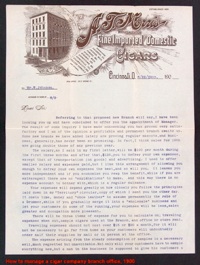
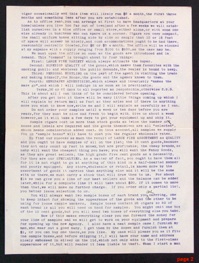
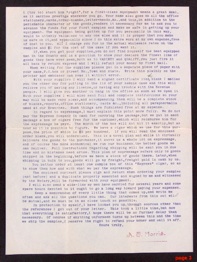
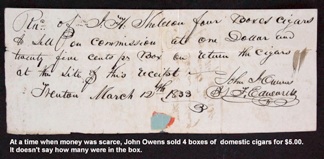
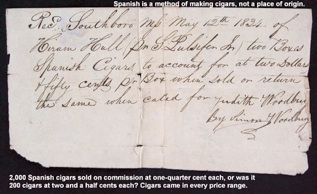
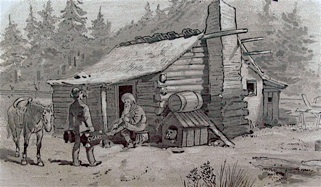
Wagons helped salesmen and peddlers
In good weather the wagon offered a place to sleep, cutting travel expenses.
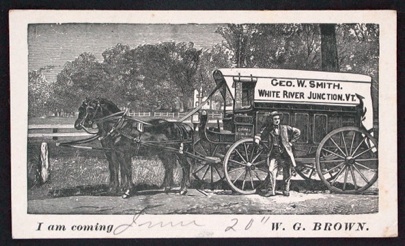
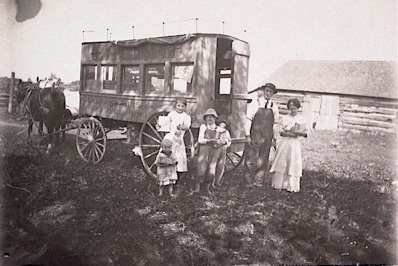
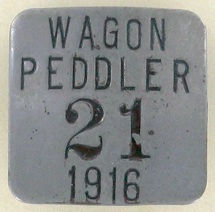
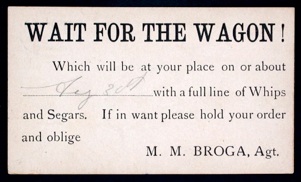
When postal cards came into being in the 1870’s salesmen quickly adopted them as a way to alert customers to their impending arrival.
They’re called “advance cards.”
To stand out from the competition, some inventive cards were created...strange ones too.
To see a selection of advance cards, click at the top of this page.
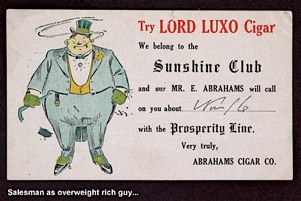
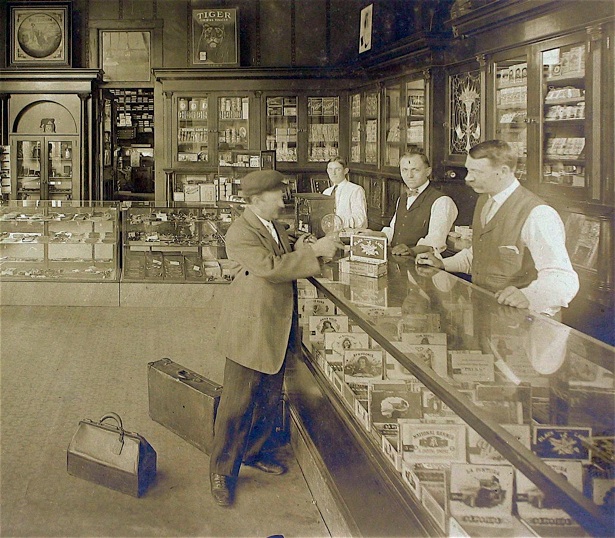
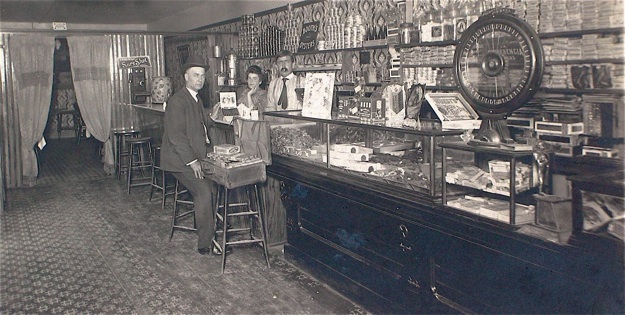
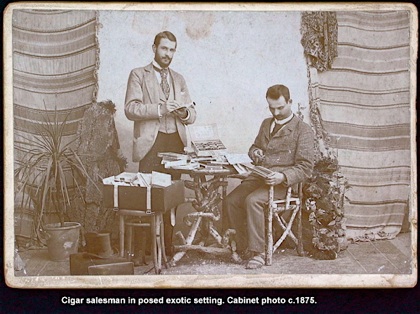
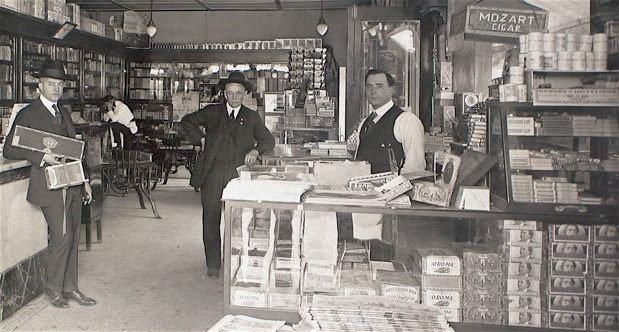
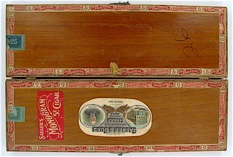
A few salesmen carried their own folding tables. This table was used c1900 by a representative of Indiana’s H. Fendrich, one of the nation's more important cigar companies, and is stenciled as company property.
Once mine, table now property of the family.
Does this 1880’s tintype depict cigar salesmen about to go
out on the road? Or two guys going home to smoke a lot?
A man in the 1800’s was seldom far from a cigar.
[0561]
This dapper twosome is ready for the road. Samples are strapped together, using a lock strap designed to go around a sample case.
Brands include REX-ROY, SALOME, OFFICE, FLOR DE MANUEL and three others. Perhaps this pair were going by automobile. Salesmen were among the earliest devotees of horseless carriages. c1912
[0523]
A lockable small trunk made a fine sample case for this dapper gent from the 1920’s or 30’s. Packed carefully, he could easily carry a dozen or more different boxes of cigars, yet keep the weight under 25 pounds. He’s showing us LA PALINA, the big selling national brand of Congress Cigar Co.
[0526]
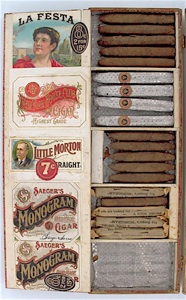
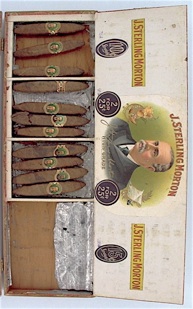
Salesmen on the road might represent a cigar factory, a small group of factories, or a national, regional, or local wholesaler.
In the machine age after WWI, wholesalers and distributors hired the majority of salesmen. As populations increased salesmen didn’t have to travel as far to do good business. Automobiles and panel trucks replaced horse & buggies and trains.
K-W was an early big player, established in 1869. In 1930, K-W was the biggest cigar wholesaler in lucrative Southern California. Candy and cigars have been wholesaled and sold together since the 1860’s.
[0529]
Like cigars, salesmen came in all sizes, shapes and styles. These brothers [?] pose around 1905 with TOM KEENE and POE brand cigars.
Note their fiberboard sample cases, popular because they were lightweight, strong, and relatively inexpensive.
[0520]
Fiberboard sample case from the late 1920’s to mid 1930’s. SAM GOMPERS cigars were made by a Pennsylvania cooperative, and honored the recently deceased Union leader.
Young Floyd B. Fisher displays his wares, perhaps having his photo taken in preparation for his first trip: IDLE TIME, SUZETTE, M.B. STOGIES, GOLF LINKS, JIM PARK’S MIDWEST CIGAR, V.A. [unknown man], and what looks like it could be TISH-A-MINGO.
Carefully packed, they would all fit inside his case and still leave some room for a few sample boxes.
Photo taken around 1890.
[1155]
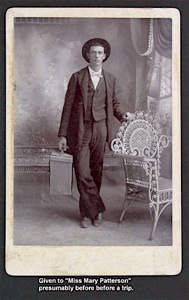
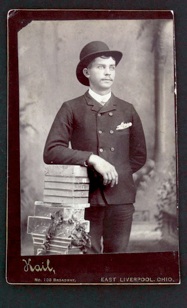
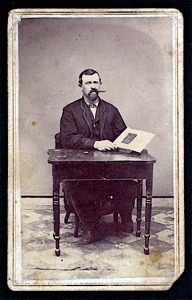
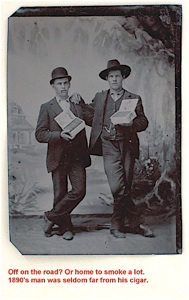
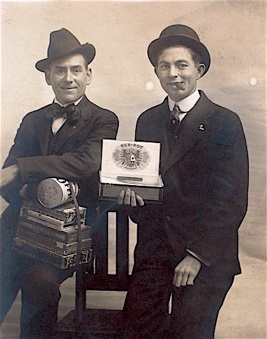
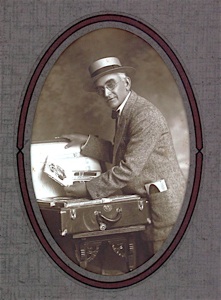
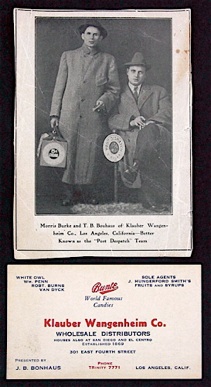
After the Civil War, Riland,
like many men, joined the
GAR veteran’s group, and
proudly displayed its badge.
Like many owners of small
factories, Riland went on the
road himself.
[0642]
Riland, like many Civil War Vets, kept his rank as well as his G.A.R.
badge and ribbon. Successful in his new business, by the mid 1880’s
Riland’s 50 rollers were shipping 10,000 cigars a day.
Being a salesmen meant long hours on the road, dreaming of home and family.
[0534]
Cautious salesmen kept their sample bags close at all times.
When traveling by rail, salesmen liked to spend time in the Parlor Car swapping lies and smokes with the other salesmen. To keep their seat, luggage, samples and wares from being stolen, they used locks attached to long flat-Y shaped chains (like on older bathroom fixtures) to anchor the handles of their bags to the cast iron armrests on the seat. If someone really wanted to steal the suitcases, it would be possible by cutting off the handles, but mostly chainlocks were to ”save my seat” while “keeping honest people honest.”
Bag lock not in the NCM collection. Photo courtesy of Don Stewart.
See STANDARD GUIDE TO KEY COLLECTING by Don Stewart,
pp. 35-37, for more on lock and key salesmen on trains.
The automobile changed travel forever
In another snapshot from the family album, Ralph poses with a young relative. Cars gave salesmen access undreamed of a century before. [0543]
Hotels sprung up across America to house salesmen
A salesman rarely lacked for company.
Salesmen blanketed America, and the nation thrived because of them.
[0507]
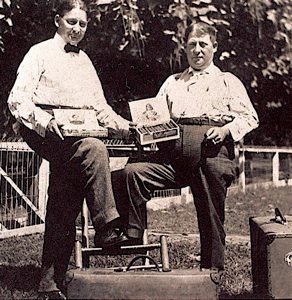
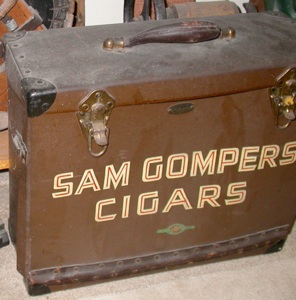
Unusual cigar salesman’s business card on a CDV very shortly after the Civil War. A very early and rare example of combining drawing and photography on a carte d’visite for commercial purposes. 1860’s.
[0558]
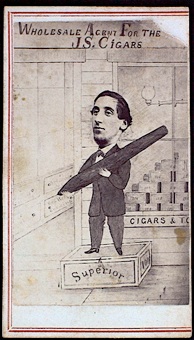
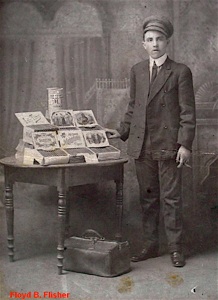
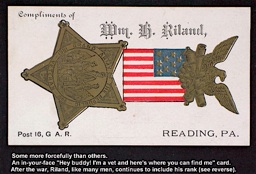
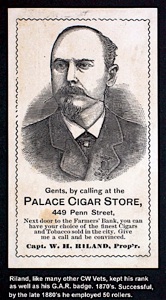
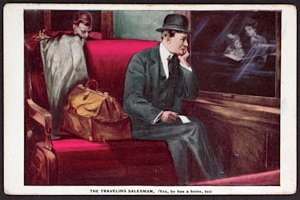
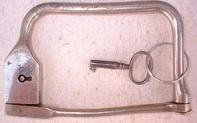
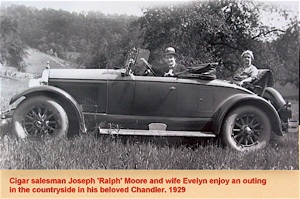
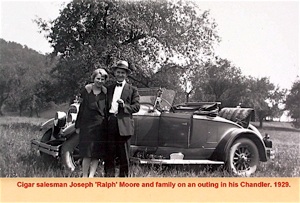
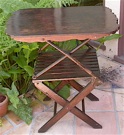
Hotel promotional card handed out at train stations, depots and any place sales-men passed through. Whomever designed the card knew what four things were most important to traveling salesmen: the price, the bar,
the stables and the selection of cigars.
c.1880.
[0569]
Salesmen’s needs
Cases, straps and locks could be ordered from some tool companies, leaf wholesalers, and box factories.
A popular inexpensive “buckle lock” was built in to a leather strap which would have to be cut by a snooper to open the case. If using a collapsing leather case, the belt could be cinched as samples were given away.
By writing on the back of the customer’s business card, this salesman cost-effectively conveyed brand, size, how the cigars were to be packed, price, quantity, terms, the color, how the boxes were to be crated, how many samples were to be included, and when and where they were to be shipped... all in 36 words. This conciseness is typical of orders which were often sent by penny post card.
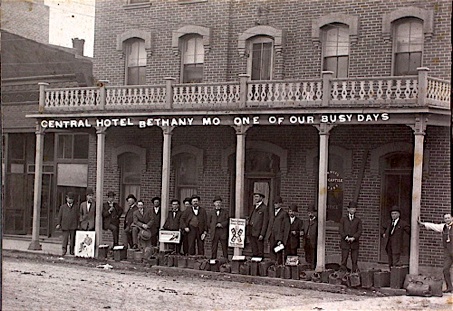
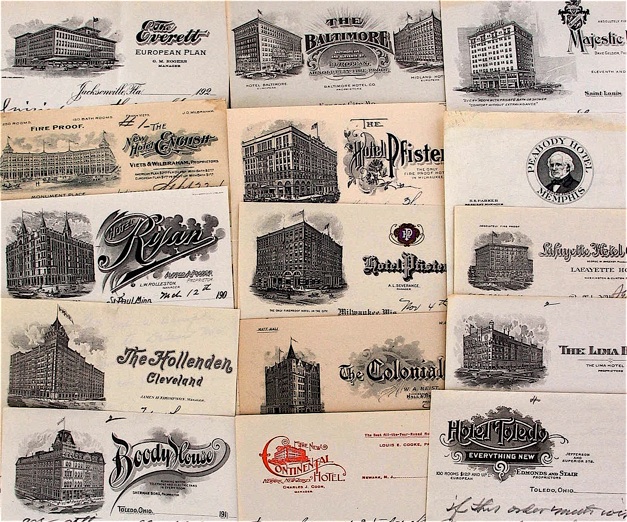
The smoking room of the Dawson Hotel in Belleville, Kansas pictured on a postcard c1910.
Salesmen, it seems were like husbands everywhere when it came to writing romantic notes.
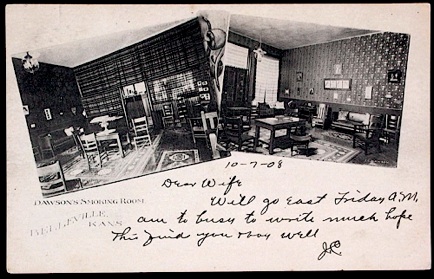
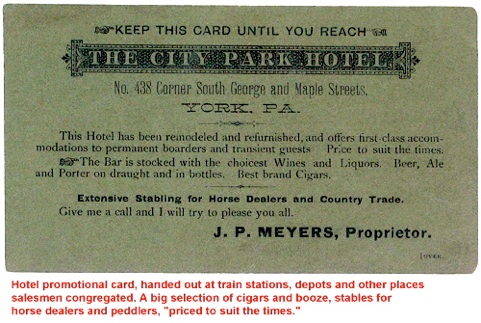
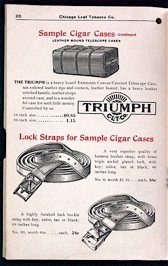
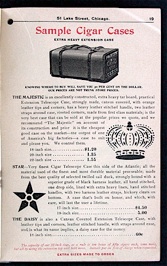
“You want a custom cigar? We can make any size, shape, blend and flavor you desire” was the pitch of thousands of salesmen representing cigar factories like Sprague. When you see reference to manufacturing for the jobbing trade it means they specialize is custom brands.
